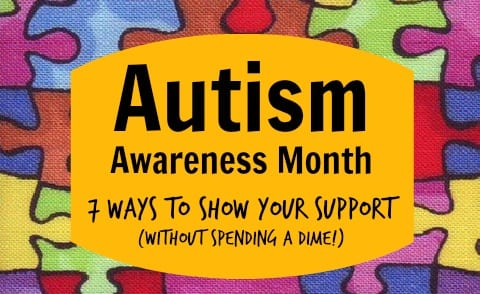Autism Awareness Month: How to Show Your Support

It was an early Spring morning a few years back and I stood talking to one of my girlfriends as she pushed her son on the swing at a local park. We were enjoying the warmer weather and chatting about her son’s autism diagnosis and the progress he had made with ABA therapy. Kelly was so ecstatic that her son was speaking! When he began ABA therapy 3 months earlier he had not yet spoken one word (he was 3 years old). Kelly and her husband fought to find a way to provide ABA therapy for 20 hours a week, draining their savings account and spending nights awake with worry.
After three months of intensive ABA therapy Jonas was finally speaking in sentences! Kelly was overjoyed and couldn’t help laughing at the funny things he would sometimes say when getting new words or phrases confused. She knew that there was still a long road ahead, but the fact that Jonas was speaking was a huge accomplishment! My own son happened to be the same age as Jonas, and Kelly and I would often laugh at their mischievousness together. I attempted to relate to Kelly’s worries about Jonas’ future.
“I know, I’m worried about Landen in pre-k this year too…” I relayed. “He is already fluently reading picture books and I’m just so afraid he is going to get bored and act out!”
“Researchers found that mothers of children and adults with autism experience chronic stress comparable to combat soldiers and struggle with frequent fatigue and work interruptions.”
I saw Kelly’s eyes well up with tears and I immediately knew that I had said something awful. My sweet friend was just enjoying the excitement of her son’s novel conversation skills and I had to insert a “humble-brag” about my typical child’s fluent reading as if it were a problem. I zipped my loud mouth shut and prayed to the good Lord that Kelly would still be my friend after today. Luckily, Kelly is one of the sweetest ladies I have ever met and she made a quick joke and changed the subject.
Autism is the fastest growing developmental disability in the United States. Alabama has one of the highest rates of autism in the United States. For this reason, I know I’m not the only mom out there who has unintentionally made a social faux pas (and I work in the field!). In a study published in the Journal of Autism and Developmental Disabilities, researchers found that mothers of children and adults with autism experience chronic stress comparable to combat soldiers and struggle with frequent fatigue and work interruptions. COMBAT SOLDIERS!! (you can read more about the study here).
Below, we outline some easy ways to interact with your friends and family members who are raising a child with special needs. These are simple yet extremely meaningful ways to help out without having to spend a dime.
My friends have a child with autism – what should I be aware of?
As parents, we all face struggles with our own children. Some struggles that parents of children with autism face are:
- Missing excessive days of work due to their child’s health related issues
- Not having access to respite care or a babysitter that can watch their child while they go out. In short- lack of a social life.
- Increased pressure on their marriage, not enough time to spend together alone, or too many demands, disagreements about treatments, financial stress, etc.
- Having to take their teenage boy into the public women’s restroom because he is not yet independent in toileting
- Missing out on important things such as your child telling you that he/she loves you, wanting to be held or cuddled, or even giving a hug
- Having to give up a career, sell a house, or even move to another state in order to find and provide quality treatment for their child
7 Ways to Make a Difference
- Offer to watch their child for an evening.
- Teach your own children how to use PECS or sign language so that they may communicate and socialize with their peers that have autism.
- Join a social skills group with your child or sign your child up to be a peer buddy at school- they are usually looking for typical peers.
- Offer support and friendship without judgment! If your friend has a different way of interacting or disciplining her child with special needs, ask before you judge. There is most likely a very good and well-educated reason for what she is or is not doing. Also, just talking as a friend can make an incredible difference in someone’s day. When your life is consumed with doctor’s appointments and therapy sessions, having a simple conversation with a friend is often and unfortunately rare.
- Encourage tolerance in your own children. Educate them about autism and other developmental disabilities and teach them to have hearts filled with empathy.
- Keep the dialogue open. Show interest in your friends and their child’s diagnosis. Don’t be afraid to ask questions and educate yourself. Most parents of special needs children have become experts on disabilities and teaching strategies, and can offer great advice! Start today by asking questions such as, “What is your biggest struggle as a parent? Are there simple ways I can help you or your child? What is one thing you would like everyone to know about your child?
- Remember the new golden rule: “How you make others feel about themselves says a lot about you”. Parenting is difficult. It’s joyous. It’s tiring. It’s a wonderful gift. Let’s encourage and uplift each other, especially those who may need a little extra support. We never know when the tables may turn and we need some empathy and support ourselves.
ABOUT THE AUTHORS: Madison Behavior Therapy provides the highest quality therapy and treatment in Applied Behavior Analysis. Linday N. Chapman is a Board Certified Behavior Analyst and Owner/Director at Madison Behavior Therapy. Mallory Wilkerson is a Board Certified Assistant Behavior Analyst and Clinical Supervisor at Madison Behavior Therapy.




